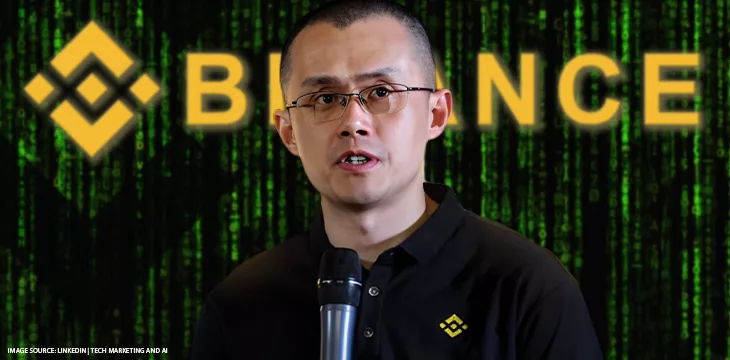|
Getting your Trinity Audio player ready...
|
Binance founder Changpeng ‘CZ’ Zhao has been sentenced to four months in prison after a U.S. federal judge appeared to have been served a giant glass of Binance kool-aid.
On April 30, U.S. District Judge Richard Jones for the Western District of Washington sentenced CZ to four months in prison with no supervised release period to follow. It’s a far cry from the 36 months the Department of Justice had sought and only slightly worse than the probation-only fate CZ’s attorneys had argued was appropriate.
Last November, CZ and Binance reached a $4.3 billion settlement with the DoJ based on the exchange’s blatant violations of U.S. law that enabled money laundering, sanctions evasion and terrorist financing to a degree unmatched by other digital asset exchanges. CZ, who traveled to the U.S. last November to enter a plea of guilty to violating the Bank Secrecy Act (BSA), has been out on bond ever since.
CZ had agreed not to appeal any prison term longer than the 18 months called for in the sentencing guidelines, but the DoJ sought to double that sentence as a way to “send a message to Zhao but also to the world” that future shenanigans of this sort by digital asset operators would result in serious hard time.
But from the start of Tuesday’s hearing, Jones appeared ready to give CZ a (nearly) free pass. In what must have caused prosecutors’ jaws to drop, Jones had the affrontery to claim that there was “no evidence that the defendant was ever informed” that Binance was facilitating illegality.
This flies in the face of internal Binance communications, including those in which CZ acknowledged the illegality of his company’s strategies and stated plainly that it was “better to ask for forgiveness than permission” before deciding to habitually break the law, without which Binance would not be the colossus it is today.
Before hearing from both sides’ attorneys, Jones appeared ready to agree with an earlier court report that a 10-16 month prison term followed by 1-3 years of supervised release was appropriate.
The DoJ went first, arguing that leniency “will incentivize others to break the law and to do it in the largest scale possible.” The DoJ went on to say that the BSA that CZ admitted violating “will for all intents and purposes be a dead letter” without some indication that violating it to such a significant degree carries a sufficiently stiff penalty.
The DoJ emphasized that whatever belated acknowledgement CZ might express now regarding his failure to implement anti-money laundering and ‘know your customer’ controls, this “wasn’t a mistake. This wasn’t a regulatory ‘oops.’”
CZ’s team countered that their client had willingly returned to the States to plead guilty, despite residing in the United Arab Emirates, which lacks an extradition treaty with the U.S. His lawyers further argued that CZ had instructed Binance to cooperate with U.S. authorities, a transparently self-serving move that should have been viewed as far too little and far too late after so many years of reckless disregard for U.S. law.
CZ’s attorneys also referenced some mysterious evidence currently under seal that contained some “compelling factor” that Jones ought to take into consideration.
When it was CZ’s turn to face Jones, he apologized and claimed to be “taking responsibility” by recognizing his mistakes and instructing Binance to stop doing all that illegal stuff that he instructed them to do.
Jones initially claimed to have been “deeply troubled” by CZ’s ‘better to ask for forgiveness’ quote. But Jones also said he didn’t think CZ was likely to reoffend, stating (without evidence) that “everything I see about your history and characteristics are of a mitigating nature and a positive nature.”
Jones told CZ that he thought he’d gotten a sense of “who you are” by reading the various letters submitted to the court from friends and family praising CZ as a stand-up guy. Jones then said a four-month sentence was “appropriate and reasonable,” which is likely cold comfort for the victims of fraud, theft and—yes—terrorism that would have been so much harder to perpetrate without Binance continually looking the other way.
At this rate, we half expect Jones to be named Binance’s new highly-compensated head of pretend-compliance following a suitable interval… perhaps four months would work.
No monitor, no cry
U.S. authorities have yet to install the independent transaction monitor on behalf of both the DoJ and the Treasury Department’s Financial Crimes Enforcement Network (FinCEN) that Binance agreed to when it reached its November settlement.
Despite that settlement calling for the monitor to be appointed within 60 business days, the process is taking far longer. The authorities’ original choice—the law firm of Sullivan & Cromwell—has met with pushback due to what some perceive as the firm’s too-tight relationship with Sam Bankman-Fried’s defunct FTX exchange.
SBF claimed that S&C pressured FTX into filing for bankruptcy protection in November 2022, further alleging that the law firm was improperly ensuring it got paid before FTX’s customers. S&C has gone on to play a major role in FTX’s post-bankruptcy restructuring, earning close to $200 million in fees in the process.
Two weeks ago, Bloomberg reported that it was the DoJ who’d expressed concerns over S&C’s ties to FTX, while FinCEN reportedly remained convinced the lawyers were okay. While neither agency has publicly confirmed these reports, the brouhaha has left Binance alone to continue conducting its business without external oversight. What could possibly go wrong?
Red letter (and/or notice) day
Meanwhile, Binance’s alleged facilitation of currency manipulation in Nigeria continues to generate headlines. On April 30, Garba Baba Umar, a Nigerian vice-president of the executive committee of global crime fighters Interpol, went on Nigerian television to offer an update on fugitive Binance exec Nadeem Anjarwalla.
Anjarwalla and fellow Binance exec Tigran Gambaryan were both arrested by Nigerian authorities in March but Anjarwalla jumped bail and is believed to have sought refuge in Kenya. An Interpol ‘red notice’ was issued regarding Anjarwalla, authorizing law enforcement officials to detain him pending extradition proceedings by Nigeria.
Umar told Nigerian’s Sunrise Daily that Interpol was doing everything in its power to ensure Anjarwalla “doesn’t escape justice.” Umar added that it was “just a matter of time” before Anjarwalla was brought back to Nigeria to face the music.
French fried
CZ’s legal woes may come back to haunt Binance’s European ambitions, given its choice to establish Binance France as its hub for accessing the rest of the European Union via the EU’s Markets in Crypto Assets (MiCA) regulations.
It’s been suggested that France’s Autorité des Marchés Financiers (AMF) regulatory body could conclude that CZ—who owns 100% of the Binance France subsidiary—is ineligible to hold a license given his criminal conviction. While CZ could transfer his ownership stake to another Binance bigwig—such as co-founder Yi He, who is also mother to two of CZ’s children—it’s not clear that this would be sufficient to ensure AMF approval.
For one thing, the Paris Public Prosecutors Office announced last summer that it was investigating Binance for suspected aggravated money laundering. True to form, Binance was laggard in applying for a license to operate in France, allowing it to continue serving French customers for years without any regulatory oversight.
Binance France is also the subject of a lawsuit filed by 15 local investors who claim to have lost €2.4 million on Binance before the company received its AMF diploma. The gist of the suit is that Binance was illegally marketing its wares to French customers, including via a Telegram channel called ‘Binance French.’
The investors claim Binance used this channel to promote the TerraUSD boondoggle as being backed by U.S. dollars (which it most assuredly wasn’t). Binance denied these claims, saying the only ‘safe’ guarantee it provided was referring to the exchange, not any tokens traded on it.
Number go down
Finally, the fiat price of most prominent digital assets tumbled hard ahead of CZ’s sentencing, hitting lows they haven’t seen in months. Also falling were the stock prices of companies inextricably tied to the ‘crypto’ sector like the Coinbase (NASDAQ: COIN) exchange and Michael Saylor’s MicroStrategy (NASDAQ: MSTR). The latter lost 17% of its value by the end of Tuesday’s trading.
The uncertainty over CZ’s fate may have played a role but there’s also the perceived lackluster performance of Hong Kong’s BTC spot-based exchange traded funds, which made their debut earlier that day. But the main reason could be as simple as Tether going too long without printing new USDT stablecoins (with or without backing) that help fuel the wash trades that ensure ‘number go up.’ (Expect a fresh infusion of USDT before the week is through.)
Perhaps adding to Tuesday’s ‘crypto’ unease was the surprise announcement by the DoJ that Roger Ver had been arrested in Spain over the weekend and will be extradited to the U.S. to face charges of tax evasion and mail fraud. Is it just us, or does everyone who has such a problem with the BSV Blockchain ultimately turn out to be the criminals we say they are?
Watch: Teranode and the Web3 world with edge-to-edge electronic value system

 04-26-2025
04-26-2025 





